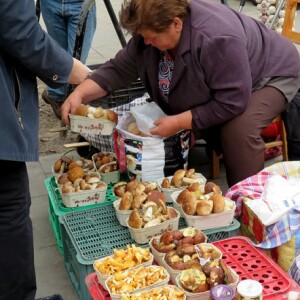A feeling for fungi
Drying the subject of my previous blip along with some smaller specimens.
This was a familiar sight around the house during my childhood when my small family would travel long distances, with knives and baskets, to reach the right sort of woodland for fungi. And yes, we took all we could.
"Pick shaming" (criticizing people for over-gathering) is a no-no in fungus foraging circles. Mushrooms are the simply the fruiting bodies of an underground organism and removing them does no harm, in fact it helps to spread their myriads of powdery spores. There's really no point in leaving any for other notional pickers, it's just too bad if they didn't get there first. There will be other fungi in other locations.
They are not an important food for any species of animal, apart from the larvae of a few flies.
Some mushrooms we sold. That too is controversial. There's a common xenophobic riff about East European "gangs" coming over here to pick all our fungi and sell them at a profit.
Well, yes, wild food has become big business and there are many high end restaurants that pay a lot for freshly-gathered fungi to offer to well-heeled clients.
Eastern Europeans have the requisite knowledge (as do many country folk on the European continent, in Scandinavia, Asia and the Americas.) We in Britain never seem to have acquired a feeling for fungi. Why shouldn't the people in the know exploit their knowledge and their willingness to get out into the woods at dawn?
There's nothing new about gathering and selling wild produce, it's a traditonal way for rural folk to sustain themselves and there are always customers who relish the opportunity to sample country flavours from their rural roots, or recipe books.
The extra pic shows a woman selling fungi (and garlic, and eggs, and honey) on the street in Warsaw, as I photographed her there in 2017. There were many other people doing the same thing. A little bit of private enterprise, or a sustainable business opportunity, either way propping up a precarious lifestyle.
(On a personal note, my father was Eastern European (from Ukraine) and he was not above selling the fruits of the forest, or his garden, for a bit of cash. Either way, it was hard-earned.)
“Mushroom foragers work for themselves. No companies hire them. There are no wages and no benefits; pickers merely sell the mushrooms they find. Some years there are no mushrooms, and pickers are left with their expenses. Commercial wild-mushroom picking is an exemplification of precarious livelihood, without security.”
From The Mushroom at the End of the World by Anna Lowenhaupt Tsing, without a doubt the best book I have ever read on the subject of foraging. She describes how marginalized people such as refugees, war veterans and the itinerant poor, in north-west USA, have created a haphazard livelihood from supplying the inflated demand for a certain species of mushroom for export to Japan where it represents a commodified luxury gift item that rarely even reaches the dining table.


Comments
Sign in or get an account to comment.


